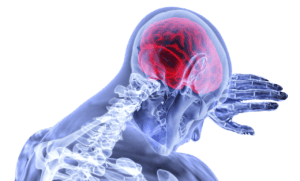Mental Training After Injury – Building That Prefrontal Cortex Bridge
It would be foolish to assume we could go through life without getting injured. Not only that, but one of those injuries that brings a tear to your eye. This isn’t down to the pain of the injury sustained, (although this is a key factor) it’s down to the fact you can’t see yourself getting back to where you were right before you ended up lying on the floor in a heap like a pile of dirty laundry.
Mental training after injury is one of the most overlooked forms of recovery. If you have had a serious injury, you will know the mental mountain you have to climb to reach your peak once again.
The Road to Recovery – Bigger Picture
Where to begin?
Firstly, look at the time frame given to which the injury itself would to take to heal. Look at the bigger picture here and set out your stall with tiny but manageable progress. Remember that there will be physical set backs during the recovery period. It is how you deal with this and move forward afterwards.
It is in these moments when things will seem impossible, you may find yourself in your darkest hour. Having the support of family and friends can be huge, always consider the possibility of sharing any negative thoughts (remember sharing is caring) as just unloading your worries can feel like having one of those old cartoon style anvils being lifted off your chest. Communication is key, sharing any concerns with a professional such as a doctor or your physiotherapist may help.
If you find it hard to talk to people maybe consider writing down what types of emotions you are feeling, keeping a log of all the frustrations and anxieties is good fuel to help you move forward. Always remember you are never alone.
Maintaining Laser Focus – Climbing That Progression Ladder
The oldest cliche in the book is the saying “one step at a time” but this does apply, when you are past the initial process of your recovery program and you are having physiotherapy. These type of exercises can be the most boring and mundane of routines. This is where a lot of people falter, as they give up doing the exercises recommended due to boredom.
Now…think about where you were only recently, think about how you never thought you would be at this point right now. Look how far you’ve come. I don’t like to look back but at this point it’s well worth doing so. Progress can be slow but repairing broken bones and torn muscles is a long process so be patient.
The Power of Visualisation and the Law of Attraction
Think about how you were before your injury. One of the most powerful tools here is visualisation or guided imagery (GI), sitting still and picturing how you want to be when you are back to fitness can be a massive boost when you can’t seem to see or feel any progress. The majority of athletes today use this technique of picturing themselves scoring the winning goal or landing that knockout punch on an opponent. There are no limits to what you can imagine here.
The 2006 book “The Secret” by Rhonda Byrne, the law of attraction is the process of having gratitude and visualizing prosperity, relationships and health to name a few. It does sound a little out there, but people all around the world swear by this method. The process is still visualization and it can be very helpful at helping maintain focus pretty much all the way through the recovery process and after you are back in training.
Another book to consider is “Psycho Cybernetics” by Maxwell Maltz. Maltz was a plastic surgeon who believed the “self-image” is the key to improved personality and behaviour. By Mentally changing these attributes you in turn change your personality and behaviour to being the type of person you would want to become.
There are now thousands of books, apps and videos online in the field of self-help. These can at times feel a tad cheesy, but are worth thinking about as they can unlock the door to mindsets you didn’t know existed.
Stimulation of Other Pursuits
You always have to bear in mind the fact you have to stimulate your mind with other interests. This can be very helpful in distracting you from the recovery process and give you a well-earned break from rehab mentally and physically. One thing I like to do is meditate daily. Sometimes I can feel as tight as a coiled spring with the day to day pressures of work. Meditation works as a reset for my brain and helps give me mental clarity for the rest of the day.
Spending time with friends and family can help break the monotony of rehab.
What other interests do you have?
Is there anything you have always fancied doing but haven’t made time for? Anything is better than watching day time TV right? (sorry to any Columbo fans out there).
Making time do something new is a great way of shifting focus and stimulating your enthusiasm.
Reaching the End of That Tunnel
One thing that is overlooked are the financial implications that injuries can have on people, not to mention the mental strain they can have on relationships. The easiest thing to do is push away those who are closest to us. Loved ones must be patient and offer support at all times. Remember it’s not you they are frustrated with but injury sustained.
Hopefully you have reached a point where you are progressing back to steady fitness and health. The journey to this point has probably been one of the toughest challenges you have ever faced. Getting back to fitness isn’t just about letting the broken bones repair, there’s also the mental scars we all carry from not being able to do the things we love day in and day out.
Whatever you do moving forward from this point, it’s worth being grateful to those around you that have been helpful and supportive on your path to recovery. Now might be a good time to set new goals and focus on improving on where you were before your injury.
Please don’t forget to check out other posts and YouTube Channel (don’t forget to subscribe) for the latest health and fitness news, CBD news, along with product reviews, meditations, recipes, workouts and if you require any CBD for you post workout therapy needs, please take a look at our store to get hold of yours now.



Very interesting article, we underestimate the power of the mind. Have you considered assessing what natural products may help keep the mind healthy, it could help amplify everything you talked about.
All the best and thank you for a great article
You are definitely right in your comment. There are natural ways to boost cognition and they should be considered. Future post will be coming on this.
A while back I eperienced a knee injury. I discovered a physical injury is also a psychic injury.
I remember laying on the mountain with my knee clearly out of alignment. I had 1000 times done things more serious it seemed without injury before in my life. I was in shock.
I remember the hard road after surgey until the day about a year later, I was walking down a deserted hallway and took off running as fast as I could. Healed at last. Than you for the great information. CQ
The mental scars of injury can stick with us long after recovery. Stay safe and fit my friend.
I have literally experienced, first hand, how a physical injury can be improved with a more positive mental attitude. I was in a road accident and hurt my shoulders and ribs. It took me a good 3 months to get those bones repaired, but the pain just wouldn’t go away.
And then I started meditation, and the change was miraculous.
Thanks for reaffirming my faith.
AB
Hi,
people who have experienced injury know the blood, sweat and tears you have to go through to get back to a healthy level of fitness. It can be one of the hardest things anyone can do. Mental training after injury is so important for people who are struggling with seeing the light at the end of the tunnel, at least with this post, people have a way of compartmentalising what they need to do in order to take small steps back to mental parity. Meditation is a great way for people to gain peace and focus at any point of their lives, but during times of mental challenges even better. That’s a great shout.
Thanks and speak soon.